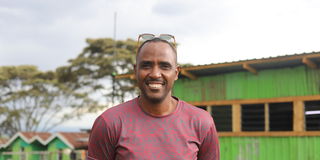A tribute to Nakuru schools birthing great rugby talent!

Some of the schools that have produced the best rugby players in the country.
In Nakuru, rugby is not just a weekend thrill, it is a culture that thrives in schools, matures in clubs, and blossoms on national and international stages.
For years, schools in the county have quietly served as feeder programs for the senior teams of Menengai Oilers and Nakuru RFC, producing players who have gone on to play for the Kenya Simbas, Shujaa, and even professional leagues abroad.
This story is not told from the sidelines but through the eyes of Gibson Weru, the head coach and one of the founding members of Menengai Oilers.
Weru is no stranger to the system. He schooled at Nakuru Day Secondary, rose to play for Nakuru RFC, wore the national jersey for the Simbas, and even had a stint in semi-professional rugby.

Menengai oilers head coach Gibson Weru during an interview with Mtaa Wangu on September 9,2025.
Today, he is guiding the Oilers while reflecting on the schools-to-club pathway that shaped his own journey. He notes Nakuru schools remain central to the sport’s success.
“For us as Oilers we have greatly benefited from Nakuru schools,” he says.
Currently, he singles out Menengai High School and Nakuru Day Secondary as the two biggest talent farms for Nakuru rugby.
He adds primary schools like Philadelphia Academy to have also played a crucial role by introducing the game to children at a young age.
From there, some pupils join Nakuru Day or Menengai High, continuing the pipeline that eventually feeds Nakuru’s senior clubs.
Weru shares that from the pitches of these schools have come some of Kenya’s finest rugby names.
“I can note just a few, including Harold Anduvate from Menengai High School, who later captained the Oilers, represented Shujaa, and now plays professionally in the US. Canada-based Brian Ndirangu, also from Menengai High, played for the Oilers and Simbas before moving abroad. And Clinton Odhiambo of Nakuru Day went on to turn out for Oilers and the Simbas and is also in Canada now,” he notes.
He adds that others like brothers Philip Okeyo and John Okoth, played for New Life Academy , proceeded to Nakuru RFC and then Menengai Oilers, while also donning the Kenyan jersey for the national team.
The story is the same for Nakuru RFC, which has also benefited from this school-to-club system, producing Simbas and Shujaa regulars and even sending players abroad.
According to the club’s Director of Rugby, Edward Moseti, Wanyore’s strength lies in this steady stream of players from local classrooms and their transition from age-grade rugby to national duty.
He says, from Koelel High, both Oscar Ouma and Edwin Makori honed their game before making it to Nakuru RFC and later turning out for Shujaa and the Simbas.
Additionally, the likes of Isaiah Nyariki, a product of Nakuru High School, had been dependable players for the Simbas, while Nick Lango carried his rugby dreams from Njoro Boys to the same stage.
Moseti notes that international player Monate Akuei also started his career at Kirobon High, rose through Wanyore to feature for Shujaa , before heading abroad for professional rugby in New York.
“The latest player from Nakuru schools to grace the international stage is on the women’s side, Grace Adhiambo, who first picked up the ball at Freehold Primary, grew through Nakuru RFC before cementing her place with the Kenya Lionesses and earning a professional contract in Europe with Racing 92,” he adds.
Weru, however, notes that despite this success, rugby still faces hurdles in Nakuru schools.
Some administrators perceive it as a high-risk sport, discouraging participation.
Additionally, a lack of basic resources like rugby balls, coaching, and facilities slows down the growth of the game in many schools in Nakuru.
“The schools give us talent, and in return we must support them. That’s the only way to sustain this cycle,” Weru explains.
For Weru, the future of Nakuru rugby looks bright.
“If we keep strengthening the link between schools and clubs, the best of Nakuru rugby is still ahead,” Weru concludes.
